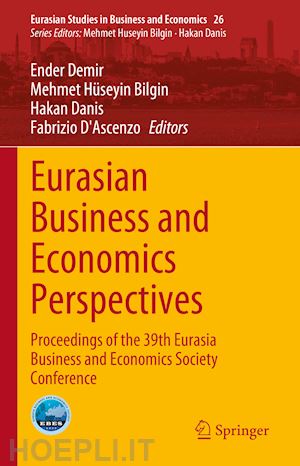
Questo prodotto usufruisce delle SPEDIZIONI GRATIS
selezionando l'opzione Corriere Veloce in fase di ordine.
Pagabile anche con Carta della cultura giovani e del merito, 18App Bonus Cultura e Carta del Docente
EBES conferences have been an intellectual hub for academic discussion in economics, finance, and business fields and provide network opportunities for participants to make long-lasting academic cooperation. This is the 26th volume of the Eurasian Studies in Business and Economics (EBES’s official proceeding series), which includes selected papers from the 39th EBES Conference which took place in 2022 in Rome. The conference was organized with the support of the Istanbul Economic Research Association in hybrid mode with both online and in-person presentations at the Faculty of Economics, Sapienza University of Rome in Rome, Italy. At the conference, 205 papers by 436 colleagues from 49 countries were presented. Both theoretical and empirical papers in this volume cover diverse areas of business, economics, and finance from many different regions.
Part 1: Eurasian Business Perspectives: Education.- Chapter 1. The Impact of Measures During the Covid-19 Pandemic in the Education Sector: the Experience of Slovakia.- Chapter 2. Role of Social Media to Influence the Environmental Knowledge and Awareness Towards Education for Sustainable Development in Malaysia.- Part 2: Eurasian Business Perspectives: Human Resources Management.- Chapter 3. The Effect of Personal Branding Factors on Generation Y Employability and Career Satisfaction: the Case of Croatia.- Chapter 4. No Captain on Deck: a New Understanding of Leadership in Cross-border Post- M&A Integrations.- Chapter 5. Academic Spin-offs’ Growth: Exploring the Role of Team Vertical Diversity and Academic Knowledge Corridor.- Part 3: Eurasian Business Perspectives: Management.- Chapter 6. Cross-industrial Analysis of High-growth Firm Performance During the Pandemic: Middle-sized Russian Firms’ Evidence.- Chapter 7. Data Management in Enterprises Under the Influence of Digital Transformation.- Chapter 8. How to Manage Delays and Disruptions at Intermodal Transportation Hubs in a Better Way?.- Part 4: Eurasian Business Perspectives: Marketing.- Chapter 9. Social Media Effect on Fast Fashion Retailing: Romania Case Study.- Chapter 10. “does Your Restaurant Deliver?” the Change in Consumer Behavior Due to Covid-19 Pandemic in Restaurant Delivery Market: Study of Restaurants in Rome, Italy.- Chapter 11. The Complexity of International Marketing: Pitfalls of Dolce & Gabbana Marketing Communication Strategy in China.- Part 5: Eurasian Economic Perspectives: Accounting.- Chapter 12. Cloud Enterprise Resource Planning System and Its Implication on Accountants.- Chapter 13. Business Continuity, Business Crisis and Evolution of the Auditors’ Opinion.- Part 6: Eurasian Economic Perspectives: Cryptocurrencies.- Chapter 14. The Impact of the Covid-19 Pandemic on Bitcoin Prices.- Chapter 15. Is the Market Success of Dominant Stablecoins Justified by Their Collateral and Concentration Risks?.- Part 7: Eurasian Economic Perspectives: Finance.- Chapter 16. Stock Price Synchronicity and Information Disclosure Quality: Evidence From China.- Chapter 17. Waqf Fund Management and the Blockchain Horizon.- Chapter 18. The Impact of Covid-19 on the Liquidity of Chinese Corporate Bonds.- Chapter 19. Determinants of Financial Inclusion: an Evidence From an Emerging Market.- Part 8: Eurasian Economic Perspectives: Inequality.- Chapter 20. How Do Inequality and George Floyd’s Protests Affect the Vote Shares of Trump?.- Chapter 21. Welfare Perceptions of the Youth: a Case Study of University Students in Turkey.- Part 9: Eurasian Economic Perspectives: Growth and Development.- Chapter 22. Regional Development of Central European Countries in the Pre-covid Period.- Chapter 23. Healthcare Indicators of the Czech Republic Compared With Selected Countries of the Eu.- Part 10: Eurasian Economic Perspectives: Public Economics.- Chapter 24. Public Procurement Between Emergency and Transparency: Where We Are.- Chapter 25. The Italian Monetary Unification and the North/south Divide.- Chapter 26. Economists Making Art: Contemporary Art and New Narratives in Political Economy.- Part 11: Eurasian Economic Perspectives: Regional Studies.- Chapter 27. The Economic Impacts of Eu Climate Policies on Intra-European Aviation.- Chapter 28. The Role of Household Consumtion in Very Small, Very Open Economy.- Chapter 29. International Capital Flows and Monetary Policy in the Emerging Economies.
Ender Demir is an Associate Professor of Finance at the Department of Business Administration, School of Social Sciences, Reykjavik University (Iceland). Dr. Demir is the founder and conference coordinator of the Eurasia Business and Economics Society (EBES). He serves as the Associate Editor of the Eurasian Business Review (Springer), and as a Subject Editor of the Journal of Multinational Financial Management. He has published his research in peer-reviewed international journals such as the Annals of Tourism Research, Emerging Markets Review, Finance Research Letters, and Journal of International Financial Markets, Institutions and Money. His research interests are in corporate finance, cryptocurrencies, financial economics, and tourism economics.
Mehmet Huseyin Bilgin is a Professor at Istanbul Medeniyet University (Turkey). He has also held visiting faculty positions at Indiana University in Indianapolis (USA), Jacksonville University (USA), Zagreb University (Croatia), and Nanyang Technological University (Singapore). Prof. Bilgin has published many articles in reputable international journals. Among other several editorial duties, he serves as the Subject Editor in Journal of International Financial Markets, Institutions & Money and as the Associate Editor in Singapore Economic Review. He is the founder and current Chairman of the Istanbul Economic Research Association, and the founder and current Vice President of the Eurasia Business and Economics Society (EBES, Turkey). He has also been active as a consultant to several institutions, as a newspaper columnist, and featured in several television programs.











Il sito utilizza cookie ed altri strumenti di tracciamento che raccolgono informazioni dal dispositivo dell’utente. Oltre ai cookie tecnici ed analitici aggregati, strettamente necessari per il funzionamento di questo sito web, previo consenso dell’utente possono essere installati cookie di profilazione e marketing e cookie dei social media. Cliccando su “Accetto tutti i cookie” saranno attivate tutte le categorie di cookie. Per accettare solo deterninate categorie di cookie, cliccare invece su “Impostazioni cookie”. Chiudendo il banner o continuando a navigare saranno installati solo cookie tecnici. Per maggiori dettagli, consultare la Cookie Policy.